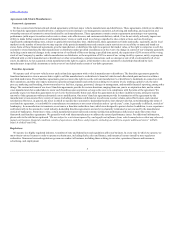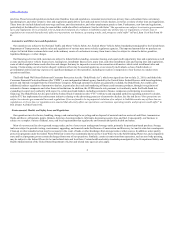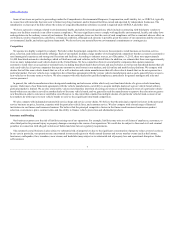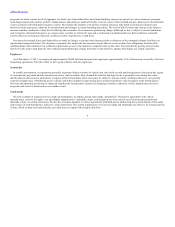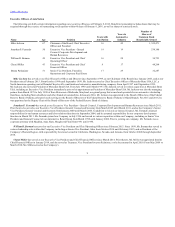AutoNation 2015 Annual Report Download - page 17
Download and view the complete annual report
Please find page 17 of the 2015 AutoNation annual report below. You can navigate through the pages in the report by either clicking on the pages listed below, or by using the keyword search tool below to find specific information within the annual report.
Table of Contents
institutions (“dealer markup”) results in a significant risk of pricing disparity in violation of The Equal Credit Opportunity Act (“ECOA”). The CFPB
recommended that financial institutions under its jurisdiction take steps to ensure compliance with the ECOA, which may include imposing controls on
dealer markup, monitoring and addressing the effects of dealer markup policies, and eliminating dealer discretion to markup buy rates and fairly
compensating dealers using a different mechanism. In response, certain financial institutions are conducting monitoring programs relating to dealer markups
and may take further steps. In December 2013, the CFPB and the United States Department of Justice (the “DOJ”) alleged that certain presumed-minority
borrowers who had obtained automobile financing from a national lender were charged higher dealer markups as a result of such lender’s policy and practice
of allowing dealer markup. In connection with the investigation, the lender consented to the issuance of a consent order and agreed to pay damages, to
implement a compliance plan, and to pay a monetary penalty. In July 2015 and February 2016, the CFPB and the DOJ reached separate settlements with two
large automotive finance companies, pursuant to which each lender agreed to implement a cap on dealer markup and pay certain damages. Each settlement
allows the lender to pay additional non-discretionary compensation to dealers. Additional investigations and actions by the CFPB and the DOJ against
automotive lenders are likely to occur in the future. Continued pressure from the CFPB, DOJ, and other federal agencies could lead to significant changes in
the manner that dealers are compensated for arranging customer financing, and while it is difficult to predict how any such changes might impact us, any
adverse changes could have a material adverse impact on our finance and insurance business and results of operations.
Additionally, the Patient Protection and Affordable Care Act, which was signed into law on March 23, 2010, has increased our annual employee health
care costs and cost of compliance, as well as compliance risks related to offering health care benefits.
Furthermore, new laws and regulations, particularly at the federal level, in other areas may be enacted, which could also materially adversely impact our
business. The labor policy of the current administration could lead to increased unionization efforts, which could lead to higher labor costs, disrupt our store
operations, and reduce our profitability.
A failure of our information systems or any security breach or unauthorized disclosure of confidential information could have a material adverse effect on
our business.
Our business is dependent upon the efficient operation of our information systems. We rely on our information systems to manage, among other things,
our sales, inventory, and service efforts, including through our digital channels, and customer information, as well as to prepare our consolidated financial
and operating data. The failure of our information systems to perform as designed or the failure to maintain and enhance or protect the integrity of these
systems could disrupt our business operations, impact sales and results of operations, expose us to customer or third-party claims, or result in adverse
publicity. Additionally, we collect, process, and retain sensitive and confidential customer information in the normal course of our business. Despite the
security measures we have in place and any additional measures we may implement in the future, our facilities and systems, and those of our third-party
service providers, could experience security breaches, computer viruses, lost or misplaced data, programming errors, human errors, acts of vandalism, or other
events. For example, several well-known retailers have disclosed high-profile security breaches, involving sophisticated and highly targeted attacks on their
company’s infrastructure or their customers’ data, which were not recognized or detected until after such retailers had been affected notwithstanding the
preventative measures such retailers had in place. Any security breach or event resulting in the misappropriation, loss, or other unauthorized disclosure of
confidential information, whether by us directly or our third-party service providers, could damage our reputation, expose us to the risks of litigation and
liability, disrupt our business, or otherwise affect our results of operations.
Our debt agreements contain certain financial ratios and other restrictions on our ability to conduct our business, and our substantial indebtedness could
adversely affect our financial condition and operations and prevent us from fulfilling our debt service obligations.
The credit agreement governing our revolving credit facility, our mortgage facility, and the indentures relating to our 6.75% Senior Notes due 2018, 5.5%
Senior Notes due 2020, 3.35% Senior Notes due 2021, and 4.5% Senior Notes due 2025 contain covenants that limit the discretion of our management with
respect to various business matters. These covenants place restrictions on, among other things, our ability to incur additional indebtedness, to create liens or
other encumbrances, and to sell or otherwise dispose of assets and to merge or consolidate with other entities. A failure by us to comply with the obligations
contained in any of our debt agreements could result in an event of default, which could permit acceleration of the related debt as well as acceleration of debt
under other debt agreements that contain cross-acceleration
15


